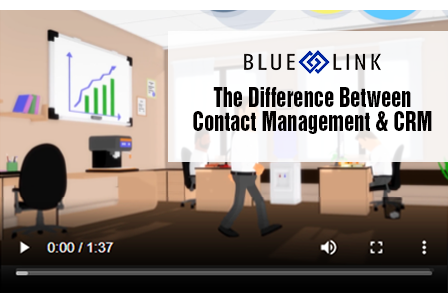In an age of short attention spans, busy schedules and smartphones, we continue to see the use of acronyms in simplifying industry terms, but this can sometimes lead to a poor understanding of the actual meaning and implications behind these phrases. An example is the use of "CRM" (Customer Relationship Management) to describe all Contact Management systems, when in fact there is a difference between a true CRM and a Contact Management system. Many software vendors use these two terms interchangeably, but this post explores the differences between the two systems, and will hopefully help you to make better decisions when evaluating software.
The Difference Between Contact Management and CRM
The main difference between a contact management and CRM system is that contact management software provides basic functionality for managing and tracking customer, vendor and individuals information and communication. CRM software provides more advanced functionality designed to manage the entire sales process, potential clients and sales leads, and all sales rep activity with some marketing functionality. Although CRM software provides tools for managing existing customers, the focus of the system is on managing your sales funnel.
Contact Management
Contact Management is a broad term that covers the tracking of customer, vendor and individuals' information and communication. Most Contact Management systems will typically allow you to track:
- Address information including ship to and bill to addresses if necessary
- Main contact information and additional contact information, including position and associated companies
- Associated sales rep information, and open quotes, orders and sales history information
- Communication with customers, vendors etc. - verbal or email
Customer Relationship Management
CRM implies a more advanced system, providing additional sales and marketing capabilities. CRM systems are typically used to fully manage relationships with customers, vendors, and prospects by allowing users to schedule upcoming actions, events and meetings, move prospects through the sales funnel, create email lists and categorize prospects and customers. CRM systems are about managing sales funnels, sales cycles and relationships, and not just storing basic information. A CRM system is particularly useful for businesses that have long or complex sales cycles requiring ongoing customer interaction, with scheduled follow-up dates and detailed communication records.
Other features to look for in both Contact Management and CRM software include:
- The ability to schedule appointments with, and send emails to, the contact from within the system
- Automatically date and time stamp notes added in order to track communication
- Ability to change and manage lead statuses
- A "lead review screen" or dashboard to alert sales reps on required activities and follow-ups for the day











